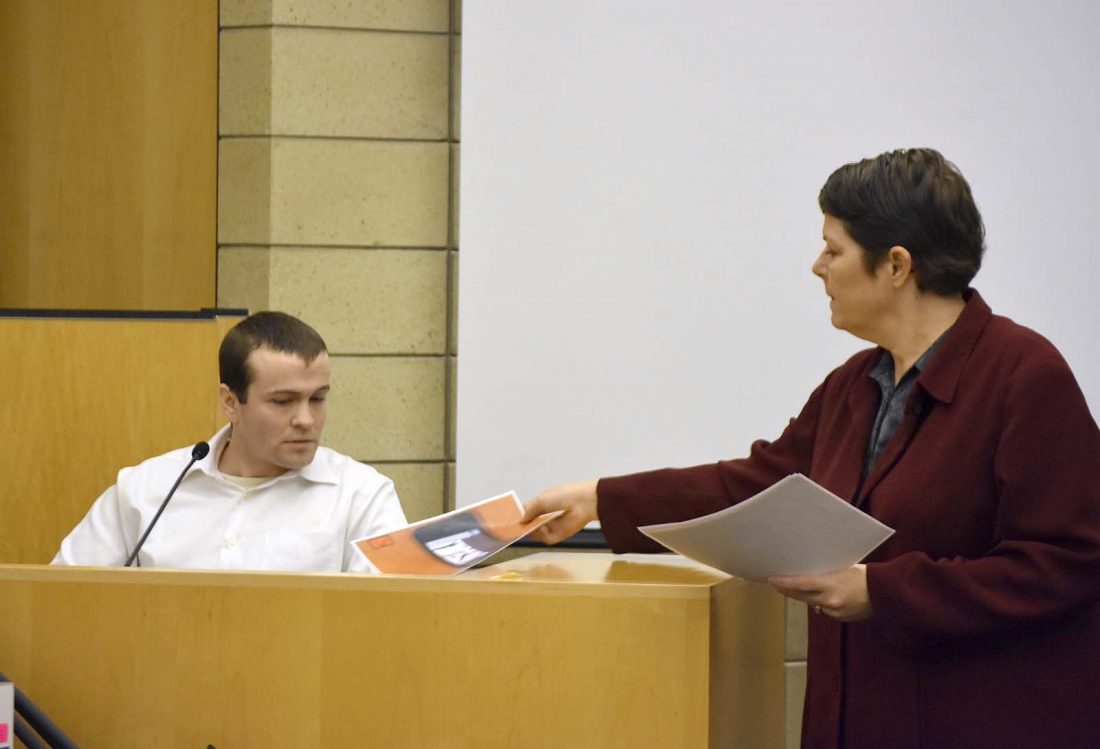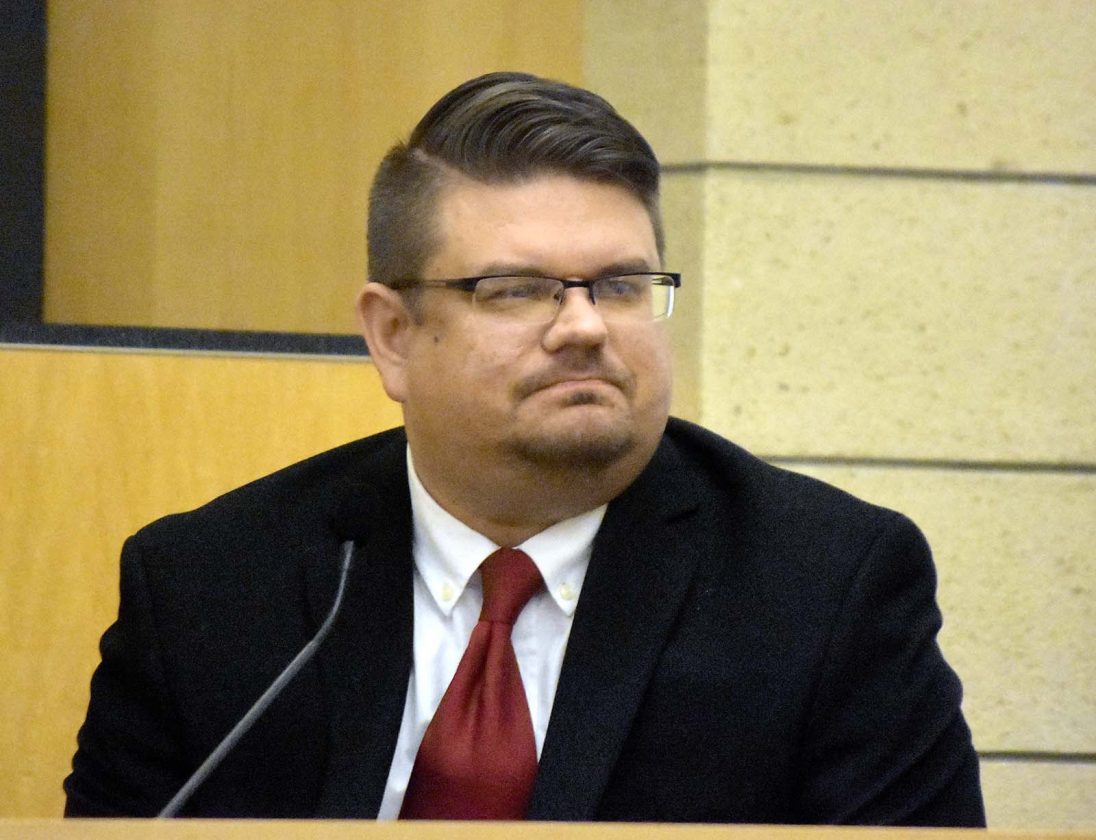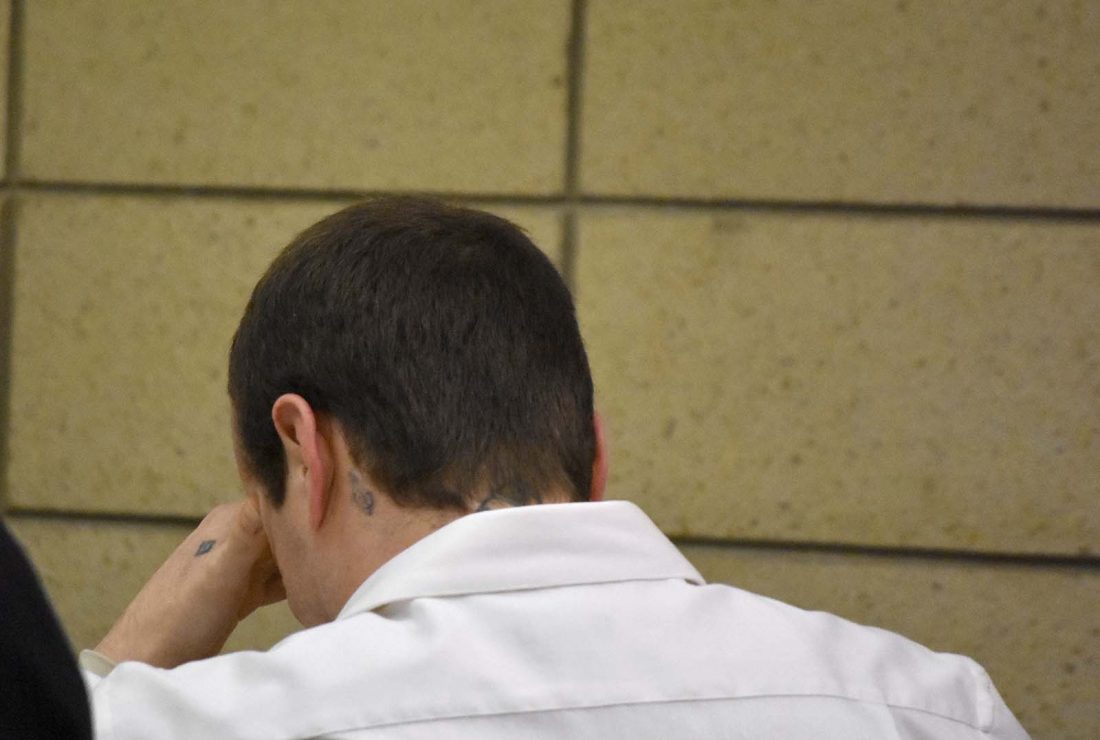Tanner King cross-examined in double murder trial
Frayed nerves cut second week short
-
-Messenger photo by Elijah Decious
Assistant Attorney General Susan Krisco finished her cross-examination of defendant Tanner King in his double murder trial on Friday.
-
-Messenger photo by Elijah Decious
Ryan Condon, an investigator on the case for the public defender’s office, testified to his interactions with Margaret Seiler. Condon said Seiler denied seeing Tanner King with a gun the night of the murders.
-
-Messenger photo by Elijah Decious
Defendant Tanner King was seen crying as Priest Wilson, long-time Fort Dodge barber and friend of the Rhodes brothers, was called by the defense team to the witness stand.

-Messenger photo by Elijah Decious
Assistant Attorney General Susan Krisco finished her cross-examination of defendant Tanner King in his double murder trial on Friday.
NEVADA — The ninth day of Tanner King’s double murder trial displayed a wide array of emotions, this time from from counsel and witnesses at the front of the courtroom, not the gallery.
Assistant Attorney General Susan Krisco finished her cross-examination of King Friday. He first took the stand Thursday, talking candidly about everything from his habit of lying and blunt walks (smoking marijuana on strolls through downtown streets) to his past criminal history and firearms use.
King also detailed specific scenes in which he says another man, Cletio Clark, confessed to the murders, and how he could not have been the one who shot and killed El Dominic and Marion Rhodes on Oct. 22, 2018.
King is charged with two counts of first-degree murder as a result of their deaths.
On Thursday, King said he was breaking street code to give the family of the victims the real truth after what he and his attorney concede is a relentless pattern of compulsive lies and changing stories.

-Messenger photo by Elijah Decious
Ryan Condon, an investigator on the case for the public defender’s office, testified to his interactions with Margaret Seiler. Condon said Seiler denied seeing Tanner King with a gun the night of the murders.
“So since you’re a liar, every sentence out of your mouth is a lie, right?” King’s attorney, Paul Rounds, asked.
“Yeah,” he replied, telling the jury that he knows his testimony will ultimately not keep him out of prison.
His attorney noted that King pleaded guilty to every other conviction on his criminal record.
Krisco was particularly interested in highlighting those types of patterns, as her questions attempted to dismantle the claims King made about the night of the murder piece by piece.
“So to take your own words, you do ‘s— in your own backyard,’ don’t you?” she asked up front, using the words King used in an interview with detectives to say that he tends to commit crimes, particularly robberies, outside of Fort Dodge.”

-Messenger photo by Elijah Decious
Defendant Tanner King was seen crying as Priest Wilson, long-time Fort Dodge barber and friend of the Rhodes brothers, was called by the defense team to the witness stand.
In asking the question, Krisco laid down the foundation of his checkered criminal history, which includes robbery, burglary, arson and firearms charges.
On Thursday, King said that he could not have been running away from the crime scene, as a state eye witness claimed, because he is unable to run since a 2012 jump from the four-story roof of the Webster County Law Enforcement Center severely injured a hip and vertebrae.
Friday, Krisco highlighted that the injuries didn’t stop him from committing arson and burglary after he healed.
Neither did the presence of his daughter, she said, who visited him in the same apartment where he was known to keep weapons and drugs as a felon. King has claimed fear for his daughter’s safety as a result of testifying.
The story of taking a midnight walk was one Krisco said she had heard about before, specifically in 2013 law enforcement interviews for the arson and burglary of Bemrich Electric & Telephone Inc.
King also told police in previous investigations, charges for which he pleaded guilty and served time, that it didn’t seem like something he’d do because “I have morals and a heart.”
He sought to have his plea overturned, saying he was coerced into it after being assaulted by three unknown men in the parking lot of Community Tap and Pizza two days before he pleaded. He claimed Mayor Matt Bemrich, whose family owns Bemrich Electric, stood 20 feet away as the assault happened.
Chief Judge Kurt Wilke, of the 2nd Judicial District, denied his motion to rescind the pleas, citing his own testimony a month prior where he stated his intent to accept a plea agreement.
“Quite frankly, he’s a liar,” Wilke said.
Krisco pounced on that situation to demonstrate what she said was King’s ability to prolifically manufacture vivid details in interviews.
The day after the shooting, King said Clark confessed to the murders in his apartment while sipping on a Dr. Pepper in his daughter’s bean bag chair.
Using text messages between the two, Krisco posed doubt that Clark could have actually been at his apartment that night. Related text messages between King and Meggin White, Clark’s girlfriend, show that White was angry at King for selling her low-quality methamphetamine.
“It’s Walmart low prices,” King responded, saying “Target” quality meth would set her back a few more bucks.
Initial police reports asserted that the shooting was at least partly a result of that conflict.
On Thursday, King claimed to be throwing away the bullets found in his apartment’s trash can because he was on parole and knew he shouldn’t have had them.
But Friday, Krisco revisited King’s time on the stand during which he detailed his recent activity with shooting guns, buying ammunition and selling drugs — all of which were obviously against the terms of his parole and the law.
A shotgun King previously claimed to have purchased for his own protection after the shooting behind his apartment building is shown in a texted picture six hours before the murders, Krisco showed the jury. State attorneys assert that a handgun was the murder weapon, not the shotgun.
Other items Krisco underscored were the Nazi-related tattoos King has. Though Rounds directed King to point out that the character is a Nazi zombie character from video game Call of Duty, King did mention on the stand Thursday that he was a member of the Peckerwood gang while in prison.
Peckerwood, a prison-only gang, is recognized by the Anti-Defamation League as a white supremacist gang.
Along that line of questioning, Krisco also quoted King in recordings and conversations calling Marion Rhodes, who was black, a “gorilla,” and using other more historically maligned slurs.
Insensitivity in his language aside, King and others displayed a side of vulnerability Friday. Conversely, attorneys were heard using foul language on the record, as well.
King was seen crying at the defense table as long-time Fort Dodge barber shop owner, Priest Wilson, took the witness stand.
Subpoenaed at what he said was the risk of his life and his livelihood, Wilson gave short testimony that indicated a long-time client abruptly stopped coming in for his bi-monthly haircuts after the murders.
“It just didn’t seem right,” he said.
Wilson, a close friend of the Rhodes brothers, was the manager of their music group. The 47-year-old burst into tears as he told the court how he got to know the victims through music.
But at the end of the fraught trial’s second week, heightened tempers and frayed emotions took their toll on the attorneys and District Court Judge Kurt Stoebe, who ended the day early.
Rounds indicated his co-counsel had been struggling not to cry throughout the day as well.
State and defense attorneys, whose tables are separated by only 6 inches, have bickered on the record multiple times over the last nine days about inappropriate laughing and side comments that have gotten under the each other’s skin.
But Friday, it came to a head.
Quoting the defendant was not the only time the Assistant Attorney General used the S-word that day. Towards the end of the day, she replied “I don’t give a s—,” to defense attorneys on the record after a tense argument.
“I’m disappointed it’s reached this point,” Stoebe said, comparing it to a time his children fought on a road trip through South Dakota.
But the final straw for Stoebe, who tentatively agreed to let a couple more witnesses proceed, was after Rounds started to get sarcastic after an unfavorable ruling.
“We’re not going to argue this,” Stoebe said, as Rounds challenged him on another matter of the state’s evidence. “It’s late in the day, it’s late in this case, Mr. Rounds.”
Sensing further objection bubbling under the surface, Stoebe asked if the lead defense attorney had anything else to say on the record.
“No your honor,” he replied sarcastically, insisting his previous comments were appropriate and something he was completely entitled to make.
“Mr. Rounds, you’ve chosen to take a tactic in this case to attack the court and attack opposing counsel. It’s wearing thin,” the judge concluded. “Perhaps it is time that we pull the plug for the weekend.”
“See you Monday,” he said as he walked away from his chair.





